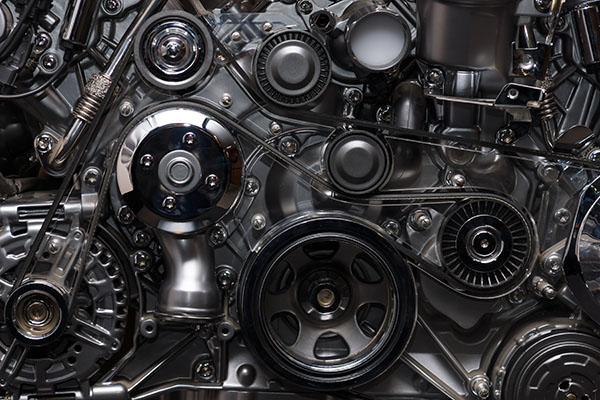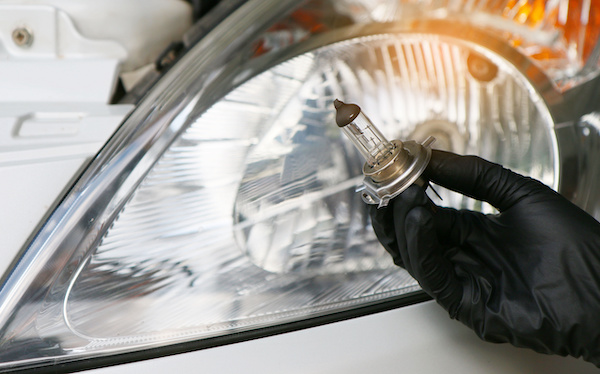Posted on 3/27/2024

Embarking on a mountain adventure in Colorado is an exciting experience that promises breathtaking views and unforgettable memories. It's crucial to ensure that your vehicle is in top condition before traveling through the Rocky Mountains to handle rugged terrain and changing weather conditions. Check Your Fluids Checking fluid levels is the most critical step in maintaining your vehicle's performance and efficiency, particularly in high-altitude environments. Before your Colorado mountain adventure, check your engine oil, coolant, brake fluid, and transmission fluid levels, topping up as needed. Ensure that your windshield washer fluid is also topped up, as visibility can be compromised by dust, mud, or inclement weather conditions in the mountains. Keeping your fluids at optimal levels will help prevent overheating, engine damage, and other mechanical issues during ... read more
Posted on 2/27/2024
.jpeg)
You're cruising down the road, enjoying the breeze through the windows, when suddenly, you notice something alarming—the temperature gauge creeping into the red zone. Your vehicle's cooling system is crucial for maintaining optimal engine temperature, and when it malfunctions, it can spell trouble. 1. Rising Temperature Gauge One of the most obvious indicators of cooling system issues is a rising temperature gauge on your dashboard. If you notice the needle creeping toward the red zone or a warning light illuminating, it's a clear signal that your engine is running hotter than it should be. Ignoring this warning could lead to engine damage or even complete failure, so it's crucial to address it promptly. 2. Leaking Coolant Coolant, also known as antifreeze, plays a vital role in regulating engine temperature. If you spot a pudd ... read more
Posted on 1/31/2024
.jpeg)
When delving into the world of car maintenance, two critical components often come up: the timing belt and the auxiliary belt. While they might seem similar, these belts play distinct roles in your vehicle's functionality. The Timing Belt The timing belt, also known as a camshaft drive belt, is integral to the internal combustion engine's operation. It's responsible for synchronizing the rotation of the crankshaft and the camshaft. This synchronization is crucial as it ensures the engine's valves open and close at the correct times during each cylinder's intake and exhaust strokes. Key Features of the Timing Belt: Material: Usually made from high-quality rubber with high-tensile fibers. Location: Located inside the engine and often requires disassembly of parts of the engine to access. Function: Synchronizes the engine's valves with the piston movements. Maintenance ... read more
Posted on 12/4/2023

As drivers, we're accustomed to following a set of well-established traffic laws and regulations to ensure road safety and order. However, some traffic laws from around the world leave us wondering if they were concocted in a parallel universe. We'll explore the bizarre, amusing, and outright perplexing traffic laws that exist in various corners of the globe. The Elephant Dilemma Ever wondered what to do if you encounter an elephant on the road? In some parts of Africa, drivers are required to yield the right of way to these massive creatures. It's a reminder that traffic laws can vary significantly from one region to another. Also read: 5 Telltale Signs It's Time for a Diagnostic Check Don't Run Out of Gas in Germany In Germany, it's against the law to run ou ... read more
Posted on 11/27/2023
%20(Small).jpeg)
Ever wondered what magic occurs when you press your foot down on the brake pedal and your vehicle obediently slows to a halt? It's not magic, but rather an impressive symphony of mechanical components working in harmony to ensure your safety. The Basics - A Lesson in Physics and Friction Braking is all about converting kinetic energy (the energy of your moving car) into thermal energy (heat). This transformation is achieved primarily through friction. When you press down on the brake pedal, a lever pushes a piston into a cylinder filled with hydraulic brake fluid. This fluid travels through lines to other cylinders positioned next to the brakes on each wheel. Disc Brakes In disc brake systems, which are commonly found in most modern vehicles, the hydraulic pressure forces a caliper to squeeze pairs of pads against a ... read more
Posted on 10/30/2023

Owning a Lexus is more than a symbol of luxury and dependability. To ensure it continues to deliver an exceptional driving experience for years to come, it's essential to prioritize its maintenance and care. From routine servicing to adopting specific practices that optimize its performance, nurturing your Lexus goes beyond mere upkeep—it's a testament to your commitment to excellence. Explore the essential strategies and insider tips with us down below that will keep your Lexus performing at its absolute best, empowering you to revel in the unrivaled combination of luxury and performance! Regular Maintenance and Servicing Regular maintenance and servicing are crucial in preserving your Lexus's peak performance. Adhere to the manufacturer's recommended service schedule and ensure that oil changes, filter replacements, and fluid top-ups are conduc ... read more
Posted on 9/30/2023

Your vehicle is more than just a mode of transportation; it's a sophisticated machine with an intricate network of systems and components working in harmony to get you from point A to point B. Yet, like any finely tuned instrument, your car may sometimes send out distress signals, quietly asking for attention. These signals often manifest as peculiar symptoms or malfunctions that require a closer look through a diagnostic procedure. Understanding the Diagnostic Procedure A diagnostic procedure, in the context of automotive care, is like a health check-up for your car. It involves connecting specialized diagnostic tools to your vehicle's onboard computer systems to identify and pinpoint issues. These tools read error codes and provide valuable data to trained technicians, allowing them to diagnose problems accurately. In essence, it's a vital step in ensuring your car's optimal performance and reliability. Now, let's explore the seven signs that i ... read more
Posted on 8/31/2023

In the ever-evolving world of automotive technology, one aspect that has seen significant advancements over the years is vehicle headlights. From the traditional halogen bulbs to the cutting-edge LED (Light Emitting Diode) headlights, the way we light up the road at night has transformed. This transformation is not just functional but also plays a pivotal role in the aesthetics of modern vehicles. Halogen Headlights - A Classic Choice Halogen headlights have been the standard for decades. They are known for their warm, yellowish glow and affordability. These lights work by heating a tungsten filament until it produces visible light. While they've been reliable, they have limitations in brightness and energy efficiency compared to newer technologies. The Rise of HID - High-Intensity Discharge As technology progressed, High-Intensity Discharge (HID) headlights emerged. HID headlights use a gas and an electrical arc to produce a brighter and whiter light than halogen. They offered ... read more
Posted on 7/30/2023

It's an exciting adventure to embark on a road trip during the summer. To ensure you don't encounter problems, it's essential to prepare your car for hot weather conditions. Getting Ready For Road Trips Performing these activities is vital before heading on a road trip to minimize the problems you might encounter: 1. Check Your Cooling System The cooling system prevents your engine from overheating during long drives under scorching temperatures. Inspect all components, including hoses, radiators, and fans, for any signs of leaks or damage. Ensure that coolant levels are adequate, and consider flushing the system if needed. 2. Test Your Battery Extreme heat can accelerate battery fluid evaporation and increase internal corrosion, leading to potential breakdowns when you least expect it. Have a professional ... read more
Posted on 6/30/2023
.jpeg)
The coolant in your engine serves the crucial purpose of cooling it and ensuring it does not overheat. There may be times when you do not have antifreeze or coolant and think that water will do a good enough job of cooling your car. Can you add water in place of coolant? Read on and find out. Coolant Vs. Water First and foremost, we have to define what a coolant is. A coolant is a mixture of water and additives that increases water's boiling and freezing points. The additives in coolants also help prevent engine corrosion. Therefore, the coolant regulates the engine's temperature and hence prevents it from overheating. It is crucial to check the coolant levels in your engine because it will affect the car's performance and longevity. Refill the coolant every time it is below optimal levels for better car maintenance. If your vehicle is low on coolant, then there is probably a leak in the engine. You should take the car to a mechanic or auto repair shop as soon as possi ... read more